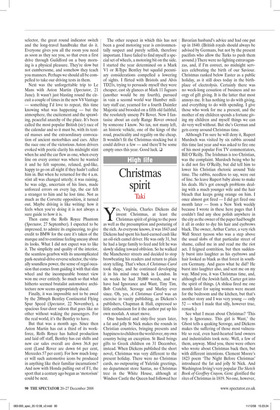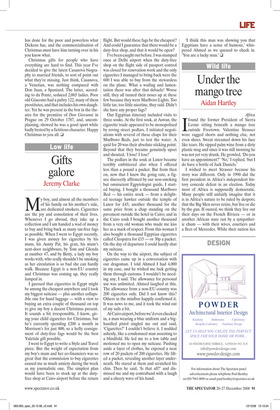Christmas spirit
Taki
Yes, Virginia, Charles Dickens did invent Christmas, at least the Christmas spirit of giving to the poor as well as the presumption and posturing of the rich. As everyone knows, it was 1843 and Dickens had spent his hard-earned cash like an oil-rich camel driver. He was only 31, but he had a large family to feed and felt he was slowly sliding toward oblivion. So he walked the Manchester streets and decided to stop browbeating his readers and return to plain story telling. That’s when A Christmas Carol took shape, and he continued developing it in his mind once back in London. In six weeks he had 30,000 words, and we have had Ignorance and Want, Tiny Tim, Bob Cratchit, Scrooge and Marley ever since. Oh, yes, A Christmas Carol was an exercise in vanity publishing, as Dickens’s publishers, Chapman & Hall, expressed so little enthusiasm for it the author put up his own moolah. A smart move.
One hundred and sixty-five years later, a fat and jolly St Nick makes the rounds in Christian countries, bringing presents and happiness to children the world over, my own country being an exception. St Basil brings gifts to Greek children on 31 December, instead. When Dickens published the short novel, Christmas was very different to the present holiday. There were no Christmas cards, no outpouring of Yuletide greetings, no department store Santas, no Christmas tree in the White House, although at Windsor Castle the Queen had followed her Bavarian husband’s advice and had one put up in 1840. (British royals should always be advised by Germans, but not by the present pacifists who allow the Turks to push them around.) There were no lighting extravaganzas, and, if I’m correct, no midnight services celebrating the birth of our Saviour. Christmas ranked below Easter as a public holiday, as it still does today in the birthplace of electrolysis. Certainly there was no week-long cessation of business and no orgy of gift giving. It is the latter that most annoys me. It has nothing to do with giving, and everything to do with spending. I give those who work for me a present, and the mother of my children spends a fortune giving my children and myself things we can do very well without. But she’s German and gets corny around Christmas time.
Although I’m sure he will deny it, Rupert Murdoch was visited by six rabbis around this time last year and was asked to fire one of his most popular Fox TV commentators, Bill O’Reilly. The Irishman is too Christian, was the complaint. Murdoch being who he is did not fire O’Reilly, but did tell him to lower his Christian rhetoric around Yule time. The rabbis, needless to say, were out of line. So leave Rupert baby alone to make his deals. He’s got enough problems dealing with a much younger wife and the hair bleach that keeps going orange on him. I once almost got fired — I did get fired one month later — from a New York weekly because I wrote in these here pages that I couldn’t find any shoe polish anywhere in the city as the owner of the paper had bought it all in order to dye his hair and eyebrows black. The owner, Arthur Carter, a very rich Wall Street tycoon who was a step above the usual slobs of that particular street of shame, called me in and read me the riot act. I feigned contrition, but then suddenly burst into laughter as his eyebrows and hair looked as black as that forest in southern Germany. And guess what he did? He burst into laughter also, and sent me on my way. Mind you, it was Christmas time, and, although of the Jewish faith, Carter got into the spirit of things. (A shiksa fired me one month later for saying women were meant for the bedroom and the kitchen, but that’s another story and I was very young — only 52 — when I made that silly, however true, remark.) See what I mean about Christmas? ‘This boy is Ignorance. This girl is Want,’ the Ghost tells a quaking Scrooge, and Dickens makes the suffering of those most vulnerable so real, even hard-hearted land owners and industrialists took note. Well, a few of them, anyway. Mind you, there were others who wrote about Christmas back then, but with different intentions. Clement Moore’s 1823 poem ‘The Night Before Christmas’ introduced the fat and jolly St Nick. And Washington Irving’s very popular The Sketch Book of Geoffrey Crayon, Gent. glorified the rites of Christmas in 1819. No one, however, has done for the poor and powerless what Dickens has, and the commercialisation of Christmas must have him turning over in his you know what.
Christmas gifts for people who have everything are hard to find. This year I’ve decided to give the latest Casanova biography to married friends, to sort of point out what they’re missing. Just think, Casanova, a Venetian, was nothing compared with Don Juan, a Spaniard. The latter, according to da Ponte, seduced 2,065 ladies. Poor old Giacomo had a paltry 122, many of them prostitutes, and that includes his own daughter. Yet he was present in the box in the theatre for the première of Don Giovanni in Prague on 29 October 1787, and, uncomplaining, showed he was a good sport while badly bested by a fictitious character. Happy Christmas to you all. ❑























































































































 Previous page
Previous page